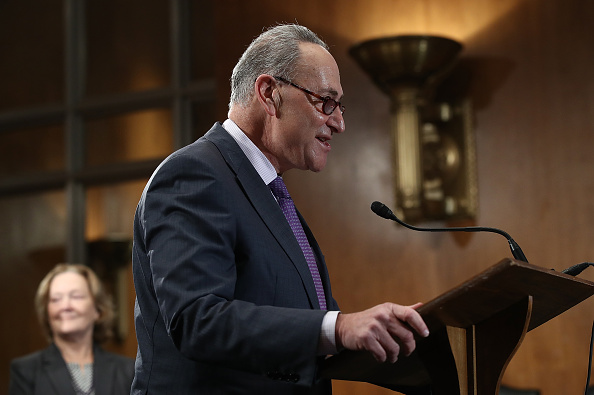
Democrats spied an early opportunity this week to divide President-elect Donald Trump and Congressional Republicans on two sleeper issues, previewing a tactic the party could use next year to broaden its popular appeal.
Before floor debates in the Senate on Tuesday, Democrats called for long-term funding for retired coal miners’ health benefits and making permanent “Buy America” provisions in a water infrastructure bill that would require the government to only fund projects that use American-made steel.
Both are working class-focused issues that target the heart of Donald Trump’s support in coal country and in steelmaking counties that helped swing the election.
“We challenge the President-elect to follow through on his promise to America’s working families,” incoming Senate Minority Leader Chuck Schumer told reporters on Tuesday afternoon. “Stand with Democrats in supporting steelworkers and miners across the country. Tell the Republicans to reverse course.”
Neither water infrastructure nor miners’ health are glamorous, big-ticket items. But on both, Republicans in Congress are at odds with the ethos, if not the letter of Trump’s campaign promises to protect American mining and manufacturing.
Republicans in the House led by Speaker Paul Ryan removed a provision from the Water Resources Development Act—an infrastructure spending bill on the country’s waterways—that would require using American-made steel. Republicans have said in the past they believed the provision would ultimately direct federal funding to some domestic companies and not others.
Senate Majority Leader Mitch McConnell, meanwhile, has called for temporary funding for miners’ health benefits as part of a continuing resolution, or short-term government funding mechanism, instead of a long-term fix. “What I recommended to the House was miners’ healthcare for the duration of the CR [continuing resolution], and I’m hopeful optimistic that will be part of the CR when it comes over from the House.”
Democrats call the Republicans’ positions inadequate, saying they want a long-term fix in the form of legislation called the Miners Protection Act. Democratic Sen. Joe Manchin of West Virginia, along with his Republican counterpart, Sen. Shelley Moore Capito, and a couple dozen others called on the legislation to pass by the end of 2016 in order to address shortages in the miners’ health funds.
“It sounds like Mitch McConnell is at war with the coal miners,” said Democratic Sen. Dick Durbin of Illinois.
Trump campaigned heavily on protecting coal miners, which helped him win states like West Virginia, Kentucky and Ohio by large margins. While McConnell’s proposal would extend a decades-old miners’ healthcare fund, the solution is not the long-term fix Democrats and some Republicans are calling for.
Republicans said they wanted to make sure miners got benefits. “We’re trying our best to meet those needs,” said Rep. Hal Rogers of Kentucky, chairman of the House Appropriations Committee. “Obviously I want to see us take care of those miners as best we can, considering the circumstances.”
The water infrastructure bill would require government projects to use American-made steel, a provision that is a major boon for steelmakers who have hemorrhaged production to China and Turkey.
“By removing my Buy America standard, Speaker Ryan and House Republicans are embracing the status-quo in Washington. This is a failure by House leadership to make a solid commitment to American manufacturers and workers,” Democratic Sen. Tammy Baldwin of Wisconsin, who pushed for the provision, said in a statement.
As Democrats struggle to find their footing after a disastrous election, many in the party have called for measures to build support among working class voters in the so-called Rust Belt states.
For Democrats it is less a change it reflects less a change in policy than a change in messaging, as they seek to highlight differences between the President-elect and his party, and seek to reclaim their title as the party of the working class.
Democrats lost by significant margins in old manufacturing states such as Ohio and Pennsylvania and faced surprise defeats in Michigan and Wisconsin. Over the next year they will seek to make back their losses, in part by muddying the Republicans’ and Trump’s message.
“We’re beginning to see the fault lines emerge, the divisions that will dominate Washington next year,” said Schumer. “Only this time, instead of the fault lines falling between Democrats and Republicans, they’re falling between the President and his own party.”
More Must-Reads from TIME
- Why Trump’s Message Worked on Latino Men
- What Trump’s Win Could Mean for Housing
- The 100 Must-Read Books of 2024
- Sleep Doctors Share the 1 Tip That’s Changed Their Lives
- Column: Let’s Bring Back Romance
- What It’s Like to Have Long COVID As a Kid
- FX’s Say Nothing Is the Must-Watch Political Thriller of 2024
- Merle Bombardieri Is Helping People Make the Baby Decision
Contact us at letters@time.com